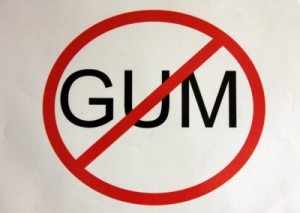 Did you know that the chewing of gum is said to be the world’s most common habit? About 100,000 tons of chewing gum are consumed every year globally… although it is very likely that Singapore does not contribute to this statistic.
Did you know that the chewing of gum is said to be the world’s most common habit? About 100,000 tons of chewing gum are consumed every year globally… although it is very likely that Singapore does not contribute to this statistic.
The government of Singapore banned chewing gum from being imported and sold in the country in 1992 to preserve cleanliness as people were disposing of their chewed up gum in inappropriate places. Many of us who have lived or travelled abroad can probably identify with the irritation of finding chewing gum on the bus seats, walls of building or worse, stuck underneath the sole of your shoes.
The regulation to ban the import and sale of chewing gum was revised in 2004 to allow the selling of chewing gum with therapeutic value. Under the regulation, chewing gum can be sold as controlled substance in pharmacies or by dentists, where consumers need to submit their names and ID card numbers for record. Now you are wondering whether it is worth it to go through the hassle in giving your name and IC to get a pack of gum?
Depending on the ingredients, there are certain brands that contain small amount of nicotine, helping smokers to quit their habit gradually. We all know how smoking destroys one’s health, including oral health! Or if you are susceptible to tooth decay, gum containing Xylitol (a sugar substitute) may have some benefit for you. Some studies have indicated that one of the benefits of Xylitol is caries prevention.
Chewing of gum after meals also helps to stimulate the production of saliva. Saliva helps to neutralize the acid produced by bacteria in plaque, which if left untouched, will erode enamel and cause dental decay and bad breath. Chewing gum can also help relieve pressure in your ears and sinuses by encouraging jaw movement.
Despite the dental benefits, however, frequent chewing may cause muscle fatigue, jaw joint pain, or headaches. Thus, moderation in consumption is always advised to prevent your jaw from overworking.
Chewing gum fans should also bear in mind that gum chewing cannot replace the need to brush, floss and make regular visits to your dentist to ensure your teeth and gums are in tiptop condition.
* Specialist Dental Group does not sell chewing gum at our clinic but you may want to check with your pharmacist if you wish to purchase chewing gum for therapeutic purposes.





